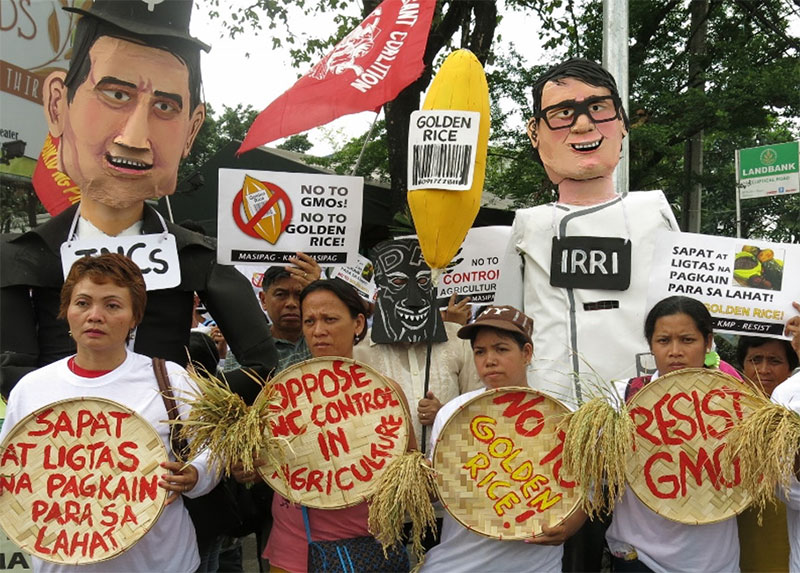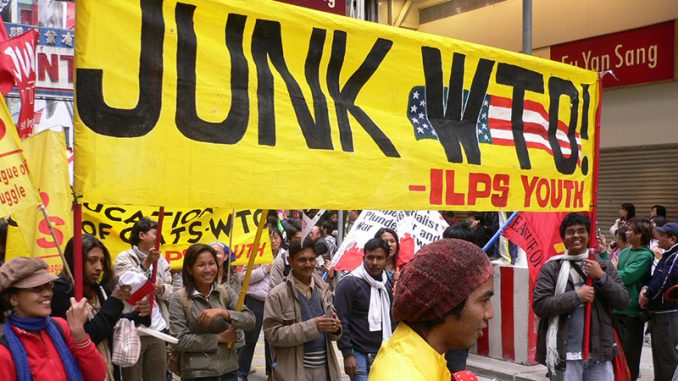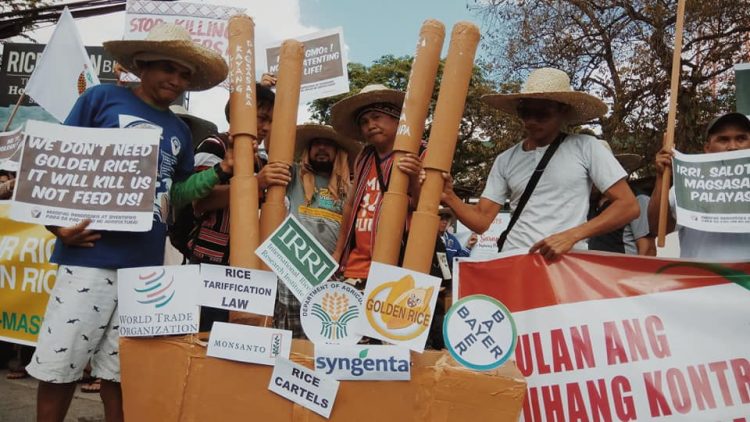The COVID-19 global pandemic is now threatening the food security of many countries and communities around the world. Just recently, Vietnam said it will halt its exports of rice for now to know whether it has enough for its own domestic use as the world rushes to cope with the new coronavirus. For China, the Philippines and several African countries that rely on Vietnam for their rice supply, the situation is precarious. Other major rice and food exporting countries may soon follow Vietnam’s lead, especially if the COVID-19 crisis gets prolonged…
This predicament illustrates how more vulnerable, in terms of their food security, many countries have become to global crises such as pandemics due to flawed policies and programs on food and agriculture. Countries that were once capable of producing their own food needs such as rice have now become dependent on foreign markets. Local farmers have been alienated from their lands and seeds, destroying their capacity to produce food for the people.
At the heart of this destruction of domestic food systems and displacement of local producers are global institutions like the International Rice Research Institute (IRRI) and the World Trade Organization (WTO).
What peasant groups call IRRI’s failure to “improve livelihoods and nutrition, abolishing poverty, hunger and malnutrition,” as stated in its mission, could not be more apparent in the Philippines where it is headquartered. The country finds itself among the top rice importers globally and its farmers no better off than before. This assessment is remarkably similar in other previously self-sufficient nations in Asia.
Globalized trade has introduced a deluge of cheap agricultural products to countries where small-scale farmers are, at the same time, bullied into cultivating cash crops for exports rather than food crops, using seeds, fertilizers, and other chemical inputs that IRRI and its allies have helped foist on the market.
The rules for an international trade order set by the WTO, since its institution 25 years ago, further skew the playing field perilously in favor of developed countries. To the detriment of their poorer counterparts, backward agriculture — further stunted by huge agribusiness interventions — reins in developing economies from heading off the impact of trade liberalization policies.
In more ways than one, trade and research under the current profit-driven global economy have gone hand in hand to tighten the grip of transnational corporations on agriculture while thrusting hundreds of millions of rural people deeper into food insecurity and poverty. The roles played by IRRI and the WTO in this scheme stand out and signal betrayal of and utter disregard for the mandates they claim to fulfill.
Business as usual for IRRI
The so-called revolution that IRRI has waged marches in lockstep with the interest of private institutions and philanthropic foundations that bankroll its operations. Among these are the very companies that cash in on the seed market which IRRI has assembled by snapping up genetic rice varieties from farmers.
In 2017, one of IRRI’s key funders, the US-based biotechnology corporation Monsanto Company, earned USD 10.9 million in the sales of field crops and vegetable seeds, according to data compiled by Agro Pages, an online media platform devoted exclusively to the global agribusiness. Bayer’s acquisition of Monsanto in 2018 is projected to secure the latter’s dominance in the global seed industry given the research capacity of Bayer, one of the largest multinational pharmaceutical companies in the world.
Meanwhile, another one of IRRI’s investors, the Swedish pesticide and seed company Syngenta, reaped USD 2.8 million in seed sales in 2017, marking a 6.4% increase following its acquisition by the Chinese state-owned petrochemical company ChemChina that same year. But Syngenta is yet to narrow its sales gap from that of Corteva Agriscience, the new agricultural brand after the Dow-DuPont merger in 2017.
The common ground among these three, despite their penchant for mergers and acquisitions to cache capital, is their aggressive push for GM seeds, which IRRI is more than willing to promote and provide.

IRRI has, in fact, upgraded its Green Revolution to the Gene Revolution. Besides genetic engineering, big data from agrochemical transnationals would help more easily identify and pry open new markets to absorb novel high-yielding varieties and heavy chemical inputs like synthetic pesticides and fertilizers.
Yet there is much in history to hark back to as a caution against the high cost of IRRI’s program.
In the 1960s, the first high-yielding variety dubbed “miracle rice” rose as the most widely planted food crop in the world — so much so that traditional paddy varieties in Asia grew less and less profitable to cultivate till they have effectively been wiped out, along with the diverse farming methods long practiced by generations of local food growers. Entrepreneurial farming has co-opted previously self-sustaining agricultural systems, locking the dwindling peasant population in usurious debts for seeds and inputs.
The 1990s registered a gradual downturn in agricultural productivity as monocrop plantations expanded, costs of farm inputs soared, and incomes of smallholders and farmers plunged. Obscenely contrary to IRRI’s promise of food security, the lack of adequate access to nutritious and sufficient diet among over 697 million people worldwide, per 2017 estimates by the UN Food and Agriculture Organization (FAO), puts them at greater risk of hunger.
More than half of this severely food-insecure population comes from Asia and 40% from Africa. It is no mere coincidence that these were the regions originally born down by IRRI’s Green Revolution. Today, not only are they under siege of food insecurity; most countries in South Asia and Sub-Saharan Africa in particular fall within serious or alarming levels of hunger, based on the Global Hunger Index in 2018.
Golden Rice and the like, touted as biofortified staple crops, may have raised calorie consumption in the developing world, but lack the nutrients and health benefits otherwise offered by once-diverse diets. Still, these crops flood the markets, due chiefly to trade inequalities that the WTO ostensibly dismisses.
More deleteriously, the WTO has been chiefly responsible for raising many underdeveloped countries’ reliance on imports, undercutting small farmer livelihoods. Feeble agrarian economies could hardly put back up the trade barriers dismantled by the WTO’s predatory policies for unchecked liberalization.
WTO’s Tricks of the Trade
The “free trade” system backed by the WTO has over the last decades increasingly resembled a robbery of domestic markets in less industrialized nations. The WTO’s Agreement on Agriculture subsumes said countries under commitments to either substituting all restrictions on agricultural imports with tariffs — the taxes or duties to be paid on a class of trading goods — or through a progressive reduction of extant tariffs. Neither of these provisions have proven advantageous in the least for the developing world.
At the losing end stand member states whose agricultural production capacity — already impaired by chronic budget slashes and state neglect — can scarcely outpace the onslaught of far cheaper imports. Conversely, their export subsidies must incrementally decrease under the WTO regime.

They may be given supposed special and differential (S&D) treatment, via longer implementation periods, but heavily subsidized agricultural trading systems in their richer counterparts are, by design, accorded with more concessions. For instance, the latter may be exempted, to a certain measure, from the WTO’s subsidy reduction provision through payments for environmental or regional assistance programs which, after all, they can afford without correspondingly exacting a dent on agricultural production support.
It is quite telling, in fact, how imports surge more copiously into developing countries. Based on the annual growth rate of aggregate import value of crops and feed, Asian countries receive almost twice the global average of imports, from 1995 to 2017, according to the UN FAO.
Even food-producing countries are compelled to follow suit. The Philippines, whose self-sufficiency ratio averaged 90% over three decades, now ranks as a major importer of rice, after a recently signed law has removed quantitative restrictions on imports of the staple. This new policy is feared to widen food trade deficits. The Philippines might follow the trajectory of its neighbor Indonesia, whose rice imports more than doubled the average before 1998, when the government opted to liberalize the agricultural sector.
Similarly, in much of the Global South, the rudimentary technological core of agricultural production already rules out fair competition in the international market. Small-scale farmers thus fare no better. On top of exorbitant rents on land, farm machinery, and post-harvest facilities, they have to cut corners to afford the seeds and chemical-based methods forced on them by agribusinesses and local merchants.
Their experience paints a glaring contrast with the consolidated control of transnational companies in the global agricultural trade. Family-based farmers in Europe and America just scrimp on the spoils from their share of expanded market access. But multinational agribusiness operations, from trading to input supply and marketing, feast on the lion’s share of overseas markets for their agricultural surplus goods.
Even at the negotiating table in the WTO, they and their allies constitute lobby groups that arguably exert more influence over various trade concerns or agenda than many governments of poor member states.
For one, the Intellectual Property Committee — composed of agrochemical conglomerates like DuPont and Monsanto, among others — weaponize patent laws to wheedle, for example, agroecological farms into ceding their seed varieties, or peasant and indigenous communities their traditional knowledge of food systems, to privatized agencies. From 1989 to 1990, the WTO’s predecessor, the General Agreement on Tariffs and Trade (GATT), began to enforce this regime under the Agreement on Trade-Related Aspects of Intellectual Property Rights (TRIPS), which the WTO then continued to impose.
From all this, the leverage gained by agribusinesses easily translates into immense profits. The confluence of globalization policies on trade and corporate research and development has undermined the food sovereignty of developing nations — thanks in no small part to both the WTO and IRRI. Majority of farmers languish in landlessness and poverty, while food production systems have been stymied.
Such are the conditions that pave the way for an alternative pathway of development — one that places the rural people, instead of a few global corporations, at the center of decision-making; that upholds the socially just framework of food sovereignty; and that genuinely responds to the people’s needs.

#NoLandNoLife Features discuss recent developments, events, and trends on land and resource grabbing and related human rights issues in the region as well as the factors and forces that drive it. Send us your feedback at nolandnolife@panap.net.








Discussion about this post